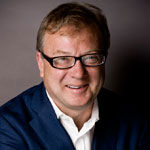
Podcasting: where are the publishers?
These are interesting times in the world of podcasting. The BBC, which not long ago was in the habit of damning the whole sector with faint praise, now has an actual commissioning editor looking at the sector and is suddenly all over it. They’ve clearly seen the signs that the young listeners which they so badly need are far more likely to find time in their lives for a podcast than they are to re-tune the radio that they don’t possess to listen to something on the other side.
At the same time, they may have noticed that some of their own talent may be inclined to follow up some of the opportunities in the world of podcasting without their help. When Radio Two did one of its periodic reshuffles recently with the result that Simon Mayo could no longer do his regular books slot, which was widely regarded by the books industry as one of the most valuable plug spots on the airwaves, he set off to do his own podcast, Simon Mayo’s Books of The Year. Being Simon Mayo, he doesn’t have to start at the bottom as most books podcasters would. His guests so far have included Robbie Williams, Lynda La Plante and Louis de Bernières, which is at the very least, a start.
Elsewhere, there are similar signs that the talent are increasingly inclined to do things without their employers. When Glamour folded as a paid-for magazine, Jo Elvin took their podcast with her. It hasn’t landed with her at the Mail on Sunday. Is It Just Me? is now something she and James Williams run on their own, along with commercial partners. It’s the kind of podcast that deals with Rick Astley, Colour Blocking and child-free weddings. Similarly, Pandora Sykes and Dolly Alderton, who used to do the Pandolly podcast for the Sunday Times, now do The High Low on their own. This is the kind of podcast that does “why ‘natural’ beauty is a damaging stereotype”. Fearne Cotton, who used to present the morning show on Radio One, now does her own podcast called The Happy Place, which has the likes of Stephen Fry and Alexandra Shulman talking about how they unlocked their inner happiness.
In the world of podcasting, it certainly helps if you can make connections without having to go through a PR. James Richardson, who used to anchor the Football Weekly podcast for The Guardian, now presents the Totally Football Show for a company which he is a shareholder in. Boyd Hilton of Heat magazine is taking the Unmissables, a weekly deep dive into TV and pop culture which he used to do for Bauer, and doing it under his own steam as Basic Bingers.
Where’s the money
I wish all these people well. They’ve clearly got more belief in the medium as well as more get up and go than the organisations for which they formerly did their podcasts. They’ll all have to find their own way of monetising their output. While Acast is clearly building a very nice business out of aggregating all this content that listeners do actually want and selling it to advertisers, I can’t help feeling that standard advertising is never going to amount to quite enough for the podcast producers and sponsorship will only get in the way of the relationship with the listener. I feel the future is more likely to lie in live events and other spin-off products.
Meanwhile, the big organisations can’t seem to get their head around the fact that people who podcast tend to do it for their own benefit first and everybody else afterwards. They should grab the coat tails of such people and hang on for dear life rather than shrugging and letting them go. I get the feeling some of our big media players may be giving up on podcasting at precisely the time it’s starting to come good.
Mean streak
Stacey Solomon has been the victim of a cover of Now magazine which was at best thoughtless and at worst spiteful. In a seemingly desperate attempt to lash together some kind of cover during those difficult summer months, they used a picture of Stacey over the words ‘boring’, ‘desperate’ and ‘cheap’. The inverted commas were intended to indicate that this is just what some people had said about her on social media and was certainly not the view of Now magazine who as we know, do everything in their power to promote personal confidence and have always been firmly on the side of the angels. Yadda yadda. Now suffered the indignity of having their official apology treated with disdain on no less a programme than that shining example of positivity and rectitude, Loose Women, an incident which ought to have its own glass case in the pot-kettle hall of fame.
The editors of women’s magazines know one great truth that the presenters of TV programmes cannot be caught saying. It is this. There’s a mean streak in readers, a streak which, when taken at the flood, can sometimes lead to a significant uplift in newsstand sales. That’s why celebrity feuds and pictures with a red ring around the cellulite always played so well. People like to see the high and mighty brought down. But you simply can’t attribute unkind opinions to “social media” as if social media were some authoritative source and not just the contemporary equivalent of the green ink letters of yore. It’s just people, very often people who’ve had a drink, being unkind and there’s something about social media that leads them to feel it’s acceptable to say things that they would never dream of saying in any other context.
The BBC website pulls itself to its full height and demands to know “what place do gossip magazines have in today’s society?” This is the kind of sanctimonious platform that the BBC likes to erect for itself. But it is an interesting question in one respect. Before social media came along, gossip magazines could get away with sniping at celebrities because it somehow seemed they were taking people down a peg or two on our behalf. We couldn’t reach into these people’s worlds so they did it for us. Now that we’ve all got the same tools at our disposal, now that we can all say something unkind about a celebrity and know that they will get to read it, the magazines who then take those comments and amplify them just seem like the worst kind of bullies.
What’s age got to do with it?
I’m not one for isms of any sort. I think they conflate human tendencies with human identity. I’m old enough to remember when we used to talk about people being “racially prejudiced” rather than them being “a racist”. I think I still prefer the former formulation because it suggests what somebody is like rather than what they are. We all have unlovable tendencies of all kinds. The mark of a civilisation is not in how it gets rid of them. It’s in how it learns to recognise them and control them.
Having said that, I fear that no less an organ than The Guardian, which is usually hotter than hot when it comes to rapping the knuckles of anyone using any prejudicial words, is guilty of what I can only call ageism in a story it ran on the media pages about John Simpson defending the BBC against accusations of being biased over Brexit. The second sentence of the story begins, “The 74-year-old journalist…”. I know this is the form but what has Simpson’s age got to do with it? What has it got to do with anything? I could understand if the item referred to how many years he had worked for the Corporation but mentioning his age in a context like this is as if the writer is suggesting the readers may care to take Simpson’s comments lightly because any day now he may be found directing traffic in his dressing gown. Maybe it’s about time this tired old convention is put to rest.












